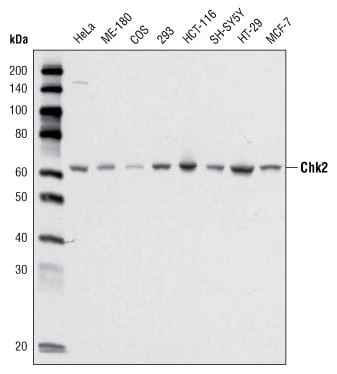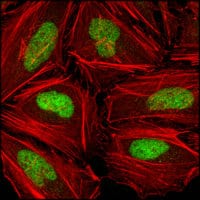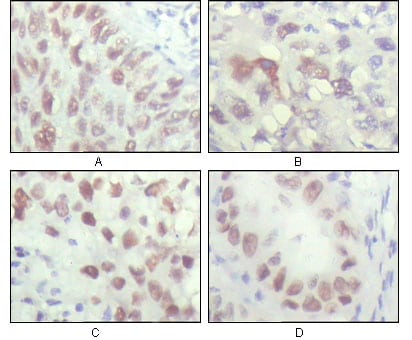


| WB | 1/500 - 1/2000 | Human,Mouse,Rat |
| IF | 咨询技术 | Human,Mouse,Rat |
| IHC | 1/200 - 1/1000 | Human,Mouse,Rat |
| ICC | 1/200 - 1/1000 | Human,Mouse,Rat |
| FCM | 咨询技术 | Human,Mouse,Rat |
| Elisa | 1/10000 | Human,Mouse,Rat |
| Aliases | CDS1; LFS2; CHEK2 |
| Entrez GeneID | 11200 |
| clone | 1C12B8 |
| WB Predicted band size | 61kDa |
| Host/Isotype | Mouse IgG2b |
| Antibody Type | Primary antibody |
| Storage | Store at 4°C short term. Aliquot and store at -20°C long term. Avoid freeze/thaw cycles. |
| Species Reactivity | Human |
| Immunogen | Purified recombinant fragment of human CHK2 (aa481-531) expressed in E. Coli. |
| Formulation | Purified antibody in PBS with 0.05% sodium azide. |
+ +
以下是关于CHK2抗体的3篇代表性文献及其摘要概括:
---
1. **文献名称**: *CHK2 kinase: cancer susceptibility and cancer therapy – two sides of the same coin?*
**作者**: Bartek, J., Falck, J., & Lukas, J.
**摘要**: 该综述探讨了CHK2在DNA损伤应答中的双重角色,指出其基因突变与癌症易感性相关,同时作为治疗靶点的潜力。文中提到使用特异性CHK2抗体验证其在肿瘤组织中的表达缺失,为靶向治疗提供依据。
---
2. **文献名称**: *Specific activation of Chk2 kinase by ionizing radiation*
**作者**: Matsuoka, S., et al.
**摘要**: 研究通过开发高特异性CHK2抗体,证实电离辐射通过ATM-CHK2通路激活细胞周期检查点。抗体用于免疫沉淀和Western blot,证明CHK2磷酸化与DNA损伤程度直接相关。
---
3. **文献名称**: *Analysis of CHK2 in vulvar squamous cell carcinomas: antibody validation and mutational screening*
**作者**: Sodha, N., et al.
**摘要**: 文章验证了多种CHK2抗体的特异性,并应用于外阴鳞癌样本检测,发现CHK2蛋白表达缺失与体细胞突变相关,提示其在肿瘤抑制中的潜在作用。
---
4. **文献名称**: *Structural basis of Chk2 kinase activation*
**作者**: Li, J., & Stern, D.F.
**摘要**: 通过X射线晶体学和CHK2抗体结合实验,揭示CHK2激酶结构域激活的分子机制,阐明其自磷酸化及底物识别过程,为设计小分子抑制剂提供结构基础。
---
这些文献覆盖了CHK2抗体的开发、验证及其在基础研究与临床中的应用场景。
The CHK2 (Checkpoint kinase 2) antibody is a crucial tool for studying the DNA damage response (DDR) pathway. CHK2. a serine/threonine kinase encoded by the *CHEK2* gene, is activated in response to DNA double-strand breaks. Upon genotoxic stress, ATM kinase phosphorylates CHK2 at Thr68. triggering its activation. Activated CHK2 regulates cell cycle checkpoints, apoptosis, and DNA repair by phosphorylating downstream targets like p53. BRCA1. and CDC25. Dysregulation of CHK2 is linked to cancer susceptibility, with germline mutations (e.g., c.1100delC) associated with Li-Fraumeni syndrome and breast cancer.
CHK2 antibodies are widely used in research to detect CHK2 expression, activation status (via phosphorylation-specific antibodies), and subcellular localization. They are essential in techniques like Western blotting, immunohistochemistry (IHC), and immunofluorescence (IF) to study DDR dynamics in cancer models, radiation/chemotherapy responses, and genomic instability. Commercially available antibodies often target specific epitopes, such as the N-terminal region or phosphorylated residues, enabling precise mechanistic insights. Validation across species (human, mouse) and sample types (cell lines, tissues) ensures broad applicability. Recent studies also explore CHK2's role in senescence, neurodegeneration, and immune regulation, expanding its relevance beyond oncology. Reliable CHK2 antibodies remain vital for unraveling its complex functions and therapeutic potential in precision medicine.
×